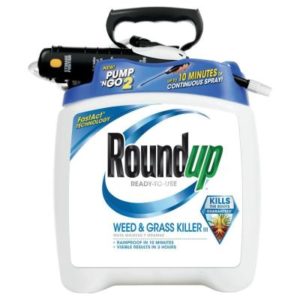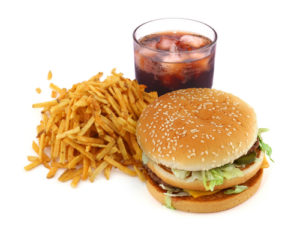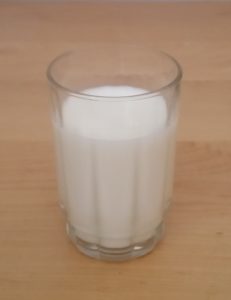 A very popular herbicide – currently the most widely applied pesticide in the world – is glyphosate, commonly known as Roundup. Global use was 1.65 billion pounds in 2014 , while overall use in the US was 276.4 million pounds in 2014. Glyphosate is a human carcinogen and linked to various health effects, and even though it is so extensively used, the FDA just announced in February 2016 that they will “soon” start testing for its presence and actual levels in food for the first time in the agency’s history.
A very popular herbicide – currently the most widely applied pesticide in the world – is glyphosate, commonly known as Roundup. Global use was 1.65 billion pounds in 2014 , while overall use in the US was 276.4 million pounds in 2014. Glyphosate is a human carcinogen and linked to various health effects, and even though it is so extensively used, the FDA just announced in February 2016 that they will “soon” start testing for its presence and actual levels in food for the first time in the agency’s history.
What, it never occurred to them that the most widely used pesticide in the world would be found in food? Of course they knew glyphosate residues were occurring in food because in 2013 the EPA raised "tolerance limits" for human exposure to glyphosate for certain foods, stating with "reasonable certainty that no harm will result" from human exposure to the chemical. This increase in tolerance levels came about from a request from Monsanto (the manufacturer of the glyphosate herbicide Roundup), and even though numerous groups protested the increase, the EPA went along with Monsanto's request. Some tolerances doubled.
But remember.... there are very strong industry pressures on the EPA, and so the EPA seems to keep its head firmly in the sand for all sorts of pesticide issues. Maybe their motto is: see no evil...hear no evil....
The reason that glyphosate tolerance limits needed to be increased in the USA is because Roundup Ready crops are now so extensively planted, and this has resulted in skyrocketing use of glyphosate in the last 20 years. Roundup Ready crops are genetically modified to tolerate repeated glyphosate spraying (against weeds) during the growing season. However, the crops take up and accumulate glyphosate, and so glyphosate residues are increasing in crops. Another reason for increased residue of glyphosate in crops is the current practice of applying an herbicide such as Roundup right at the time of harvest to non-GMO crops such as wheat, so that the crop dies at once and dries out (pre-harvest crop dessication), and which is called a "preharvest application" by Monsanto. Glyphosate is now off-patent so many other companies are also using glyphosate in their products throughout the world.
Private testing has already found glyphosate residues in breast milk, soybeans, corn, honey, cereal, wheat flour, soy sauce, and infant formula. It is currently unknown what glyphosate residues in food, which we then ingest, mean for human health. Several studies have linked glyphosate to human health ailments, including non-Hodgkin lymphoma and kidney and liver problems. Of special concern is that because glyphosate is so pervasive in the environment, even trace amounts might be harmful due to chronic exposure. Some people (including researchers) are even suggesting that much of "gluten sensitivity" or "gluten intolerance" that people complain of, may actually be sensitivity to glyphosate residues in food.
So where have glyphosate residues been found recently? In Germany's 14 most popular beers. German beer purity in question after environment group finds weed-killer traces And in feminine hygiene products in France. How to lower your daily intake of glyphosate? Eat organic foods as much as possible, including wheat, corn, oats, soybeans.
Some influential scientists and physicians just came out with a Statement of Concern regarding their serious concerns with glyphosate. The article summary (Abstract) from Environmental Health: Concerns over use of glyphosate-based herbicides and risks associated with exposures: a consensus statement
The broad-spectrum herbicide glyphosate (common trade name “Roundup”) was first sold to farmers in 1974. Since the late 1970s, the volume of glyphosate-based herbicides (GBHs) applied has increased approximately 100-fold. Further increases in the volume applied are likely due to more and higher rates of application in response to the widespread emergence of glyphosate-resistant weeds and new, pre-harvest, dessicant use patterns. GBHs were developed to replace or reduce reliance on herbicides causing well-documented problems associated with drift and crop damage, slipping efficacy, and human health risks. Initial industry toxicity testing suggested that GBHs posed relatively low risks to non-target species, including mammals, leading regulatory authorities worldwide to set high acceptable exposure limits. To accommodate changes in GBH use patterns associated with genetically engineered, herbicide-tolerant crops, regulators have dramatically increased tolerance levels in maize, oilseed (soybeans and canola), and alfalfa crops and related livestock feeds.
Animal and epidemiology studies published in the last decade, however, point to the need for a fresh look at glyphosate toxicity. Furthermore, the World Health Organization’s International Agency for Research on Cancer recently concluded that glyphosate is “probably carcinogenic to humans.” In response to changing GBH use patterns and advances in scientific understanding of their potential hazards, we have produced a Statement of Concern drawing on emerging science relevant to the safety of GBHs. Our Statement of Concern considers current published literature describing GBH uses, mechanisms of action, toxicity in laboratory animals, and epidemiological studies. It also examines the derivation of current human safety standards.
We conclude that: (1) GBHs are the most heavily applied herbicide in the world and usage continues to rise; (2) Worldwide, GBHs often contaminate drinking water sources, precipitation, and air, especially in agricultural regions; (3) The half-life of glyphosate in water and soil is longer than previously recognized; (4) Glyphosate and its metabolites are widely present in the global soybean supply; (5) Human exposures to GBHs are rising; (6) Glyphosate is now authoritatively classified as a probable human carcinogen; (7) Regulatory estimates of tolerable daily intakes for glyphosate in the United States and European Union are based on outdated science. We offer a series of recommendations related to the need for new investments in epidemiological studies, biomonitoring, and toxicology studies that draw on the principles of endocrinology to determine whether the effects of GBHs are due to endocrine disrupting activities. We suggest that common commercial formulations of GBHs should be prioritized for inclusion in government-led toxicology testing programs such as the U.S. National Toxicology Program, as well as for biomonitoring as conducted by the U.S. Centers for Disease Control and Prevention.
 A cataract is a clouding of the lens in the eye leading to a decrease in vision. It can affect one or both eyes, it is more common with age, and can even lead to blindness. About 20 million people globally are blind due to cataracts. Vitamin supplements have failed to find an effect in numerous studies.
A cataract is a clouding of the lens in the eye leading to a decrease in vision. It can affect one or both eyes, it is more common with age, and can even lead to blindness. About 20 million people globally are blind due to cataracts. Vitamin supplements have failed to find an effect in numerous studies.
 A thought-provoking
A thought-provoking  Not good news. More than half of Americans’ calories come from “ultra-processed foods,” according to
Not good news. More than half of Americans’ calories come from “ultra-processed foods,” according to  Two recent studies link low vitamin D levels with more aggressive cancers: aggressive prostate cancer in men and more aggressive breast cancers (in mice and women). Researchers generally advise people to take 1000 to 2000 international units per day of vitamin D3 to maintain normal blood levels of of more than 30 nanograms/milliliter. The best source of vitamin D is sunlight, which is why vitamin D is frequently called the sunshine vitamin.
Two recent studies link low vitamin D levels with more aggressive cancers: aggressive prostate cancer in men and more aggressive breast cancers (in mice and women). Researchers generally advise people to take 1000 to 2000 international units per day of vitamin D3 to maintain normal blood levels of of more than 30 nanograms/milliliter. The best source of vitamin D is sunlight, which is why vitamin D is frequently called the sunshine vitamin.
 Two new papers just published in the British Journal of Nutrition are analyses of existing studies that compare conventional vs organic milk, and conventional vs organic red meat. Both studies found clear differences between organic meat and milk compared to conventional milk and meat, with the organic milk and meat best health-wise, especially due to differences in
Two new papers just published in the British Journal of Nutrition are analyses of existing studies that compare conventional vs organic milk, and conventional vs organic red meat. Both studies found clear differences between organic meat and milk compared to conventional milk and meat, with the organic milk and meat best health-wise, especially due to differences in  Remember all the medical advice for years about not eating eggs frequently (high cholesterol! heart disease!) and to instead eat egg white omelettes if one absolutely wanted to eat eggs? Remember the obsession with dietary cholesterol? Well, this recent research followed 1032 men for 21 years and found that a relatively high intake of dietary cholesterol, or eating one egg every day, was not associated with an elevated risk of incident coronary heart disease - not in the entire study population nor in those with the APOE4 phenotype. Also, the study did not establish a link between dietary cholesterol or eating eggs with thickening of the common carotid artery walls. Time to enjoy eggs again! From Science Daily:
Remember all the medical advice for years about not eating eggs frequently (high cholesterol! heart disease!) and to instead eat egg white omelettes if one absolutely wanted to eat eggs? Remember the obsession with dietary cholesterol? Well, this recent research followed 1032 men for 21 years and found that a relatively high intake of dietary cholesterol, or eating one egg every day, was not associated with an elevated risk of incident coronary heart disease - not in the entire study population nor in those with the APOE4 phenotype. Also, the study did not establish a link between dietary cholesterol or eating eggs with thickening of the common carotid artery walls. Time to enjoy eggs again! From Science Daily: A recent study using
A recent study using  This study showed an association of eating lots of flavonoid rich foods (strawberries, blueberries, cherries, blackberries, red wine, apples, pears, and citrus products) and lower rates of erectile dysfunction. A higher intake of several flavonoids also reduces diabetes and cardiovascular disease risk. Keep in mind that erectile dysfunction is thought to be of vascular etiology (the cause) and so shares risk factors (such as hypertension, obesity, and smoking) with cardiovascular disease. Studies have shown that
This study showed an association of eating lots of flavonoid rich foods (strawberries, blueberries, cherries, blackberries, red wine, apples, pears, and citrus products) and lower rates of erectile dysfunction. A higher intake of several flavonoids also reduces diabetes and cardiovascular disease risk. Keep in mind that erectile dysfunction is thought to be of vascular etiology (the cause) and so shares risk factors (such as hypertension, obesity, and smoking) with cardiovascular disease. Studies have shown that